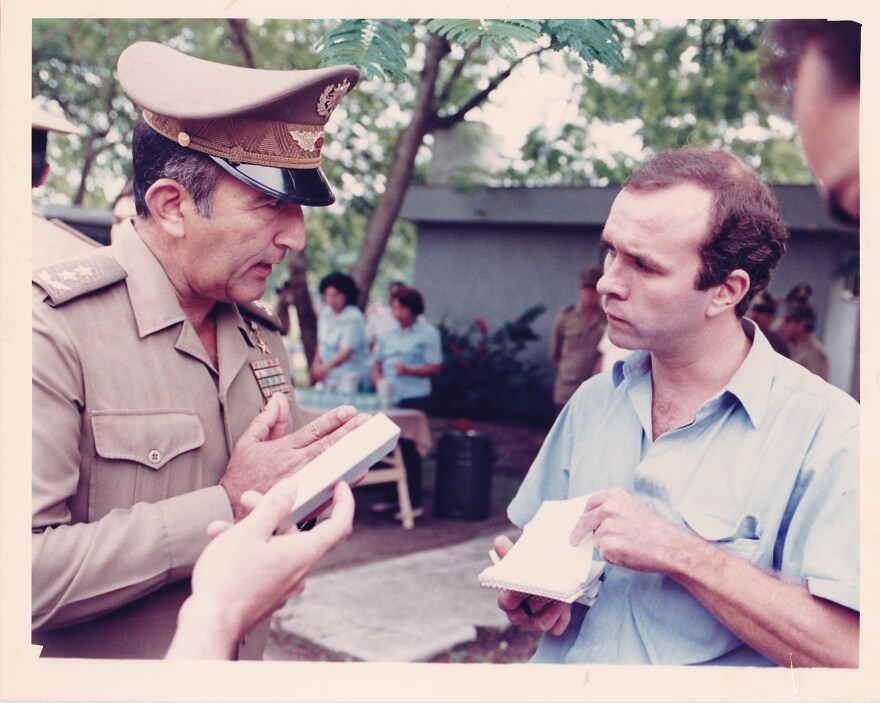On Saturday, Cuba’s communist leaders will launch their seventh party congress – a gathering to set the island’s future political and economic course. It will run through Tuesday, April 19.
The last congress was held five years ago – but since then, Cuba has normalized relations with its sworn cold-war enemy, the United States.
So will this congress, which hosts a thousand Communist Party members from around Cuba, bring more change? Democratic reform? Free-market expansion? For a forecast, WRLN's Tim Padgett sat down with award-winning journalist and veteran Cuba-watcher Pascal Fletcher. Fletcher was based in Havana for more than a decade, most of it as the bureau chief for Reuters. He now writes from Miami.
RELATED: Googling Cuba: Is The Communist Island Ready To Join The World Wide Web?
Excerpts:
Cuba's last Communist Party Congress in 2011 is remembered for pushing President Raúl Castro's economic reforms, especially the expansion of a private sector. What's different this time that might improve the chances of more reform – not just economic but political?
President Obama's visit to Havana just a couple weeks ago. He pretty much threw down the gauntlet, saying, "Don't be afraid to change, don't be afraid to listen to criticism from your own people." That really does change the context of this congress.
But did his visit raise the pressure for reform, or will it have the opposite effect and prompt communist hardliners to retrench?
I think a bit of both. It certainly stirred a debate. On the one hand you've seen Cuba's official media sites criticizing Obama's intervention, pushing back against it, the defensive posture that, if you like, has been in the DNA of the Cuban Communist Party and the Cuban leadership over the past few years. They see Obama's reform call as an invasion by sweet words rather than something more political or military, but certainly as a political threat.
On his visit to Havana, President Obama threw down the gauntlet saying, Don't be afraid to listen to criticism from your own people. That's changed the whole context of this congress. –Pascal Fletcher
On the other hand it has stirred great enthusiasm among ordinary people who do want change and are pushing for a better life. More access to Wi-Fi, you know, the things that exist in other countries. And that has created pressure on Cuba's leaders as well.
When I was in Cuba last month, Cubans did seem to speak out more openly about things like human rights. And in recent weeks we've even seen Cuba's state-run media report on complaints from Communist Party members that there hasn't been enough debate about issues leading up to the congress. There were even some calls to postpone the congress so there could be more debate. Is that a different scenario?
Yes, I think that is a bit of a novelty. We've also seen voices that criticized former President Fidel Castro. That was as unusual as these voices saying the whole party system is too secretive, too elitist. But, speaking out for political reform in a public context – and that's effectively what President Obama did – still often gets ordinary Cubans in trouble. If President Obama were an ordinary Cuban and had done that he could have been prosecuted for illegal enemy propaganda.
POPULAR CLAMOR
What realistically are some political changes that we might expect from this congress? There's been a lot of talk the past year, for example, about election reform.
OK, let's not expect any move away from the one-part socialist system. However, there is a sense that there could be some political reforms to make what is largely now a rubber-stamp National Assembly a little more representative. Your average Cubans right now just don't see it as representative of them. So I think we could see direct elections for Cuba's President and Vice President. This has been in the air for a while. That sort of thing.
And on the economic side what looks doable?

There is a process of trying to create more access to the Internet. The popular clamor for it is immense. Equally, the ability of professional Cubans to earn realistic salaries that reflect their high levels of education. That is a permanent complaint, especially from doctors.
We're hearing that they could define the legal characteristics of small private companies. So you'd have not just individual self-employment licenses to run a restaurant – but the legal framework for the creation of small- and medium-size businesses run by private people. Deeper things like the unification of Cuba's two currencies, or direct hiring by non-state companies, which is another major bugbear for foreign investors, those are more complex issues for the leadership.
You've also pointed out that these congresses are known for showcasing new faces among the communist leadership – and that seems especially relevant now that 84-year-old Raúl Castro says he's leaving office in 2018.
I think we can certainly look for it: The top four or five people in the party Politburo are all in their 80s. We might see some of the Castro scions or other younger people emerge – like First Vice President Miguel Díaz Canel, who has a constituency in the provinces, or Foreign Minister Bruno Rodríguez. Both are in their 50s, which is young by Cuban leadership standards.



